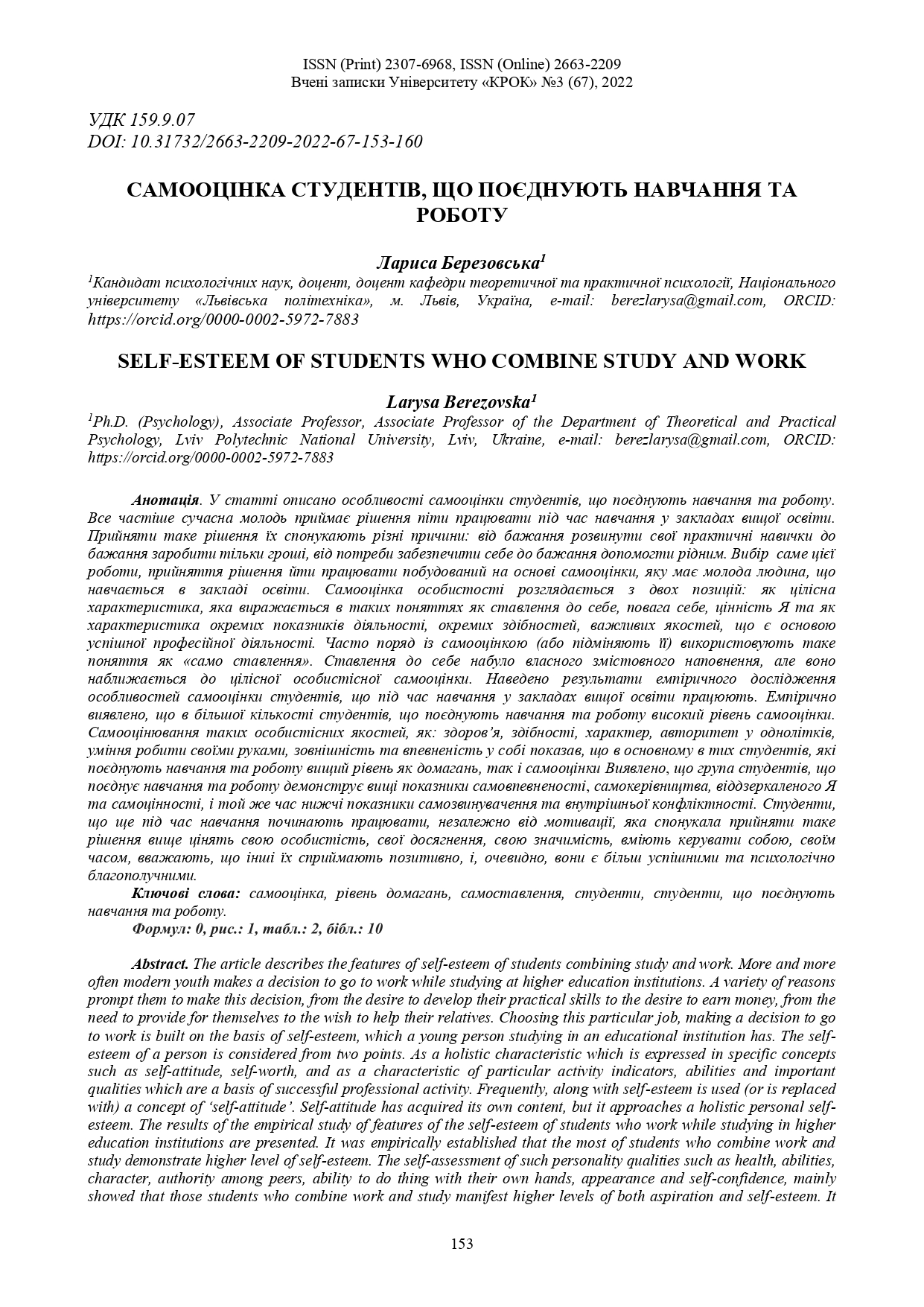SELF-ESTEEM OF STUDENTS WHO COMBINE STUDY AND WORK
DOI:
https://doi.org/10.31732/2663-2209-2022-67-153-160Keywords:
self-esteem, aspiration level, self-attitude, students, students combining study and workAbstract
The article describes the features of self-esteem of students combining study and work. More and more often modern youth makes a decision to go to work while studying at higher education institutions. A variety of reasons prompt them to make this decision, from the desire to develop their practical skills to the desire to earn money, from the need to provide for themselves to the wish to help their relatives. Choosing this particular job, making a decision to go to work is built on the basis of self-esteem, which a young person studying in an educational institution has. The self-esteem of a person is considered from two points. As a holistic characteristic which is expressed in specific concepts such as self-attitude, self-worth, and as a characteristic of particular activity indicators, abilities and important qualities which are a basis of successful professional activity. Frequently, along with self-esteem is used (or is replaced with) a concept of ‘self-attitude’. Self-attitude has acquired its own content, but it approaches a holistic personal self-esteem. The results of the empirical study of features of the self-esteem of students who work while studying in higher education institutions are presented. It was empirically established that the most of students who combine work and study demonstrate higher level of self-esteem. The self-assessment of such personality qualities such as health, abilities, character, authority among peers, ability to do thing with their own hands, appearance and self-confidence, mainly showed that those students who combine work and study manifest higher levels of both aspiration and self-esteem. It was found that the group of students combining study and work showed higher indicators of self-confidence, self-direction, reflected self and self-worth, and at the same time lower indicators of self-blame and internal conflict. Students who start working while still studying, regardless of the motivation that prompted them to make such a decision, value their personality, their achievements, their importance, know how to manage themselves and their time, believe that others perceive them positively, and, obviously, they are more successful and have higher indicators of psychological well-being.
Downloads
References
Онуфрієва Л.А. Самооцінка як складова Я-концепції майбутніх фахівців соціономічних професій. Проблеми сучасної психології: Зб. Наук. Пр.. Київ, Камянець-Подільський К-ПНУ імені Івана Огієнка, Інституту психології імені Г.С. Костюка НАПН України, 2013. Вип. 22. С. 396-412.
Козерук Ю.В., Євсейчик Я.О. Самооцінка як фактор становлення особистості студента. Вісник Чернігівського національного педагогічного університету. Серія: Педагогічні науки. 2015. Вип. 124 С. 163-165.
Большакова А.М. Часові перспективи та само ставлення студентів у професійній сфері. Збірник наукових праць. Теорія і практика сучасної психології. 2018. Вип. 1 С. 62-66.
Волошина В.О. Особливості мета когнітивних суджень студентів та їхній взаємозв’язок із самооцінкою. Студентські наукові записки. Серія “Соціально-політичні науки”. Вип. 3. 2011. с. 241-255.
Музика О.Л., Чекрижова М.М. Становлення професійної самооцінки студентів медичних ВНЗ. Актуальні проблеми психології: Збірник наукових праць Інституту психології імені Г.С.Костюка НАПН України. Т. ХIІ. Психологія творчості. Вип. 22. К.: Вид-во «Фенікс», 2016. С. 213-231.
Слободянюк А., Гречановська О. Самооцінка та її вплив на професійне майбутнє випускників ВНЗ. Матеріали XLVII Науково-технічної конференції Інституту соціально-гуманітарних наук. 2018. URL: http://ir.lib.vntu.edu.ua/handle/123456789/20168
Дідик Н.М., Онуфрієва Л.А. Самоставлення майбутніх психологів як чинник професійного саморозвитку. Психологічний часопис. 2019. Т. 5, № 8. С. 233-248.
Сингаївська І. В. Психологічні особливості узгодження особистісних і суспільних вимог до професійної успішності викладача. Проблеми сучасної психології: Зб. наук. праць. Кам’янець-Подільський: Кам’янець-Подільський національний університет імені Івана Огієнка. 2015. Вип. 30. с. 574–588.
Методика діагностики самооцінки Дембо-Рубінштейн (модифікація А.М. Прихожан). Режим доступу: http://psychologis.com.ua/metodika_diagnostika_samoocenki_dembo-rubinshteyn._modifikaciya_prihozhan. htm
Тест-опитувальник самоставлення особистості (В.В. Столін-С.Р. Пантелеев). – Режим доступу: http://psih.pp.ua/

Downloads
Published
How to Cite
Issue
Section
License
Copyright (c) 2022 Лариса Березовська

This work is licensed under a Creative Commons Attribution 4.0 International License.

